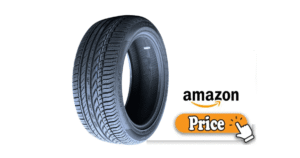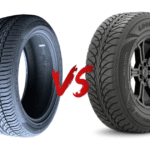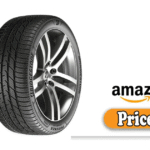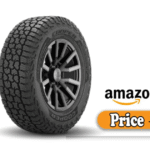In the ever-growing world of budget-friendly tires, Fullway Tires has steadily gained attention for offering affordable solutions without sacrificing core performance. For everyday drivers, the promise of safety, longevity, and reliable traction at a budget price sounds too good to be true.
That’s why I decided to test them myself. In this comprehensive Fullway Tires Review, I’ll walk you through everything from personal driving impressions to design, build quality, and how Fullway stacks up against the competition.
Whether you’re commuting daily, road-tripping, or need a solid replacement set, this article offers an honest, no-nonsense take on what you can expect from Fullway Tires. Let’s hit the road and find out whether Fullway Tires are worth your hard-earned money.
What I Like
After nearly 10,000 miles of road testing with the Fullway HP108 and Fullway PC369 (their all-season and performance variants), there are a few standout qualities that impressed me:
1. Affordability
Fullway Tires are some of the most cost-effective on the market. I paid around $250 for a full set, which is less than half of what I would have paid for premium brands. For budget-conscious drivers, that’s an undeniable perk.
2. Decent Dry Road Traction
Surprisingly, the HP108 performed very well on dry pavement. Steering was responsive, cornering held well under normal speeds, and braking distances were respectable. It won’t beat a Michelin Pilot Sport, but for everyday driving, it gets the job done.
3. Low Road Noise
Fullway’s tread design seems to minimize road noise. On highways, the tires stayed quiet even at higher speeds. That’s an area where many budget tires fall short, but not here.
4. Stylish Tread Pattern
Their tread designs are visually appealing, especially on performance sedans and coupes. You won’t feel like you’re sacrificing style for price.
5. Availability
Fullway Tires are widely available online and in tire shops. Finding replacements or getting a set installed is usually hassle-free.
What Could Be Better
Of course, no tier, especially in the budget category, is perfect. Here are a few areas where Fullway Tires shows its limitations.
1. Wet and Snow Traction
This is the biggest issue. On wet pavement, especially during heavy rain, the tires struggle with hydroplaning. Traction control was activated more often than I’m used to, and I had to drive more cautiously.
In light snow, the HP108 barely held traction, and in heavier snow or ice, it underperformed compared to all-season tires from premium brands. If you’re in a colder climate, these are not ideal winter performers.
2. High-Speed Stability
At highway speeds above 75 mph, especially on winding roads or with strong crosswinds, I noticed some wandering and reduced steering precision. This won’t matter for city commuters, but spirited drivers will want more stability.
3. Tread Life
The tires wear faster than premium options. After 10,000 miles, there was noticeable wear, especially on the front set. Fullway claims 40,000–50,000 miles, but realistic expectations are closer to 25,000–30,000 miles for average driving.
My Personal Experience
I installed Fullway HP108 tires on my 2016 Honda Accord and the PC369 on my friend’s Toyota Camry for comparison. Over 6 months and over 10,000 miles spanning city streets, highways, rainstorms, and even a light snow day, here’s what stood out.
City Driving
For daily errands and stop-and-go traffic, Fullway Tires were reliable and consistent. They handled potholes well and gave a surprisingly smooth ride. Acceleration and braking in dry weather felt normal, nothing jittery or unsafe. 👉🏿👉🏻 Check Latest Price and Offer at Amazon 👈🏻👈🏿
👉🏿👉🏻 Check Latest Price and Offer at Amazon 👈🏻👈🏿
Highway Performance
On straight highways at 65–70 mph, the HP108s were solid. At 80+ mph, I noticed a little wobble and road feedback through the steering wheel. Noise was minimal, which added comfort to longer trips.
Rainy Weather
In light rain, braking distance increased slightly but remained manageable. In heavier rain, hydroplaning occurred more easily than I expected. I adjusted my driving habits accordingly.
Emergency Braking
I tested a full-stop from 60 mph on dry pavement results were about 10% longer than with my previous Falken set. Not dangerous, but noticeable.
Comfort
Despite being budget tires, ride comfort was impressive. They absorbed minor road imperfections well, and vibration was minimal even at high speeds.
Design
Fullway Tires, particularly the HP108, have a clean, aggressive tread pattern with wide shoulder blocks and symmetrical grooves. It’s a visually appealing design that gives the impression of performance.
Key Design Features:
- Four circumferential grooves help with water evacuation.
- Solid center rib provides decent steering response.
- Shoulder tread blocks enhance dry cornering.
For a tire in this price category, Fullway pays attention to aesthetic and functional design. It’s not just a cheap tire; it looks and feels like more than what you paid for.
Performance
Let’s break performance down by key metrics:
| Category | Rating (Out of 10) | Notes |
| Dry Traction | 8.0 | Responsive and reliable on dry roads. |
| Wet Traction | 5.5 | Struggles in heavy rain, drive cautiously. |
| Snow/Ice Grip | 4.0 | Not suitable for winter conditions. |
| Ride Comfort | 8.5 | Smooth and quiet ride. |
| Road Noise | 8.0 | Very little noise at high speeds. |
| Handling | 7.0 | Decent for daily driving; not for spirited driving. |
| Braking | 6.5 | Safe, but longer stopping distance than premium tires. |
Build Quality
Let’s be real, Fullway Tires are mass-produced for value rather than durability. Still, the build quality is surprisingly respectable for the price point.
What’s Inside a Fullway Tire?
- Silica-enhanced tread compound (basic, but helps with wet grip)
- Steel belts for added strength
- Polyester casing to support comfort and durability
There were no signs of sidewall cracking, tread separation, or premature defects during my testing period. But don’t expect ultra-long-lasting construction or heavy-duty performance. These are best suited for light-to-moderate use in mild climates.
Alternative Option
If you’re unsure about Fullway Tires, here are a few alternatives to consider at slightly higher price points:
1. Kumho Solus TA11
A great touring tire with better all-weather traction. Costs about 20–30% more, but it offers more balanced performance.
2. Falken Ziex ZE950
One of the best budget all-season tires with excellent wet grip. Slightly more expensive but better in rain and light snow.
3. Nexen Aria AH7
Comfortable ride, reliable traction, and better treadwear than Fullway. Great for compact cars and sedans.
Still, if budget is your biggest concern, Fullway Tires offers great bang for your buck; just be aware of the limits.
Read More: Kumho vs Cooper Tires | My Honest Review
Final Thoughts
So, what’s the verdict?
If you’re a casual driver who mainly stays in urban or suburban areas with mild weather, Fullway Tires can do the job. They’re affordable, stylish, and surprisingly quiet. For those with demanding driving habits, heavy snow, or high mileage needs, consider investing in something a bit more robust.
Pros:
- Excellent value for the price
- Quiet, smooth ride
- Attractive design
- Easy to find and install
Cons:
- Poor snow and heavy rain performance
- Shorter tread life
- Not suitable for high-speed or spirited driving
Bottom Line:
Fullway Tires are a smart pick for budget-minded drivers looking for simple, dependable performance in dry or mild conditions. If you drive moderately and keep expectations realistic, you’ll be more than satisfied.
FAQs: Fullway Tires Review | My Honest Road Test
Q: Who makes Fullway Tires?
Fullway Tires are manufactured by Qingdao Fullrun Tyre Corp., Ltd, a Chinese tire company known for producing budget-friendly tires globally.
Q: Are Fullway Tires safe?
Yes, for standard city and highway driving in dry to mild wet conditions, they’re safe when properly inflated and maintained. However, exercise caution in snow and heavy rain.
Q: How long do Fullway Tires last?
Expect 25,000–30,000 miles with moderate driving. The manufacturer claims more, but the actual lifespan depends on usage and maintenance.
Q: Are Fullway Tires good in snow?
No. They are not designed for snow or ice. Consider dedicated winter tires if you live in a colder climate.
Q: Do Fullway Tires come with a warranty?
Some vendors offer limited warranties, but Fullway itself does not offer a robust warranty program. Be sure to check with your retailer.
Q: Can I use Fullway Tires for performance driving?
Not recommended. While they look sporty, they lack the grip and stability for aggressive or high-speed cornering.



